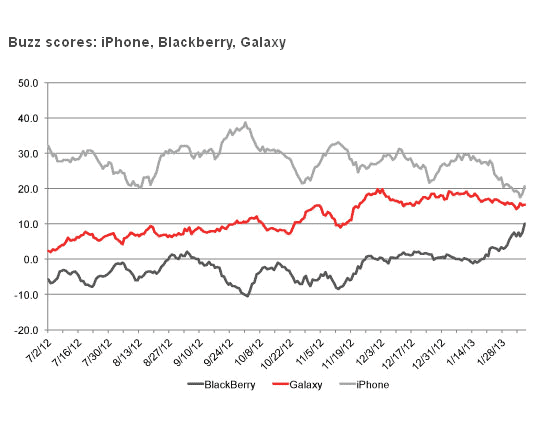
First, the boring stuff.
In a corporate video released March 26th, Rory O’Neill, VP of Product Marketing for Research in Motion, revealed the official version of what prospective attendees can expect from this year’s BlackBerry World Conference in Orlando, which begins May 1st.
“We’ll be sharing our perspective of the future of mobile, the internet, and what it means for our customers and partners worldwide” said O’Neill, adding: “We’re going to delve into BlackBerry 10. We’re going to start to share the story and the direction and the vision for BlackBerry as a company.”
O’Neill went on to point out that the conference will have a focus on developers, but that was already evident when RIM decided to run its “BlackBerry Jam” developer conference concurrently with BlackBerry World.
There is no doubt that Alec Saunders, RIM’s newly appointed VP of developer relations, will have a large presence in Orlando. As RIM lost market share to Apple and Android devices in North America one of the focal points for criticism was the lack of apps in BlackBerry’s App World. Saunders, however, insists RIM is making progress, a January a study from Singapore-based web-based search portal Mobilewalla said that BlackBerry App World had just 50,000 apps. Apple’s App Store, boasted more than 600,000 and Google’s Android Marketplace had in excess of 330,000.
Little more than three months later, RIM has tightened the gap, its number is now up over 70,000. And RIM says that between July 2011 and February 2012, it doubled its apps per day downloaded number from three-million to six-million.
_
This story is brought to you by Agrimarine (TSXV:FSH). Not all salmon farms are the same. Click here to learn how Agrimarine is meeting consumer demand for sustainable aquaculture.
_________________________________________________________________________________________________________________________
But putting apps to the side, this year’s BlackBerry World is shaping up to be a whole lot more exciting than any prior. The main reason, according to Cantech Letter sources, is that RIM intends to take a page from rival Apple and use its own conference as a platform for launching new products. This, of course, means RIM’s new BlackBerry 10 operating system, which has been tasked with nothing less than saving the company.
In all likelihood, deals with carriers have not have been made or we would have heard about it. But our sources say RIM will unveil actual functioning BB10 handsets at BlackBerry World, not just the BlackBerry 10 Dev Alpha, a prototype running a modified version of the PlayBook operating system RIM will hand out to app developers.
Is the BlackBerry 10 platform up and running? Yes. In a recent conversation with Bloomberg BusinessWeek’s Felix Gillette, new CEO Thorsten Heins said “I have to say I am pleased with the progress they are making,” adding “I’ve seen the first working software on the actual device, and I was intrigued by the stability, by the performance, and by the beauty of the user interface that I was shown.”
A reveal of BlackBerry 10 phones at BlackBerry World would be an unexpected and rare reversal. After RIM’s disappointing Q3 last December, shareholders were surprised when then CEO Mike Lazaridis said on a conference call later that, because of the unavailability of a dual-core processing chip, BlackBerry 10 phones would not be available until “the latter half of 2012”.
Another persistent rumour travels more than three-thousand miles to Orlando, from Redmond, Washington. Speculation about a RIM-Microsoft alliance is nothing new. The Guardian’s Jean-Louis Gassée recently pointed out that in January of 2007, “days after the iPhone was released..” some were calling on XBox maker Microsoft to partner with RIM on an “XPhone”. One has to go back no further than last year’s BlackBerry World when Microsoft’s Steve Ballmer stepped to the podium on day one and announced “We’re going to invest uniquely into the BlackBerry platform”.
Turns out Ballmer was talking about nothing more than RIM’s decision to make Microsoft’s Bing search engine the default search provider in the BlackBerry browser. A year later, however, some are wondering if the same scenario might be replayed with something more substantive on the line. Recently, a small item from Benzinga’s M&A Chatter section has sparked a fresh round of speculation that Microsoft would invest $3.5-billion into Research in Motion. The biggest difference between this year and last of course, is that Ballmer would be not be talking to Balsillie and Lazaridis, but new CEO Thorsten Heins who, after RIM’s fiscal 2012 conference call, said he would be interested in strategic opportunities, including partnerships and joint ventures.
That statement, of course, sparked a round of debate about whether RIM would license its platform to other developers. While Heins says licensing is part of RIM’s review of the company’s “strategic options”, more recent evidence suggests this may have been at the crux of Jim Balsillie’s surprise resignation from the RIM board.
Last week, Reuter’s tech journalist Alastair Sharp reported that, before his departure
Early in April, RIM released an expanded version of its BlackBerry Mobile Fusion server software that actually supports rival devices. Jan Dawson, a mobile analyst at Ovum said “Fusion is a recognition that RIM is losing share in enterprise devices to iOS and Android” adding: “to remain relevant its server solution needs to support those platforms too…”
With its stock trading near decade lows, RIM shareholders hope developments announced at Thorsten Heins first BlackBerry World conference as CEO can help him return the troubled company to relevance, instead of assign it to the obscurity so many of late have predicted.
_____________________________________________________________________________________________________________________
_____________________________________________________________________________________________________________________
Leave a Reply
You must be logged in to post a comment.






 Share
Share Tweet
Tweet Share
Share




Comment